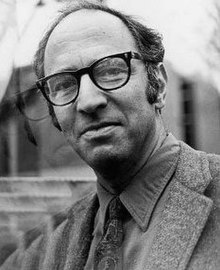I do like that Kuhn's paradigms and paradigm shifts note that science has always had its deductive as well as inductive sides. Good philosophers of science may note that good science has them work in tandem.
Documentary filmmaker Errol Morris was a graduate student of Kuhn's for a year. He decades later wrote five New York Times Opinionator columns about the experience (here's the first) and eventually turned them into a book.
His central charge? Kuhn was a relativist rejecting the idea of objective truth.
New Atlantis hated what Morris wrote, in large part because it had the usual Errol Morris style. At the same time, it admitted that Kuhn himself snarled up some of his arguments about science and history.
Steven Poole in The Guardian flat-out claimed Morris got Kuhn wrong.
John Horgan, while saying he thought Morris overdid his killing of Kuhn, said that from personal experience, he found Kuhn "almost comically self-contradictory."
Horgan and Poole also disagree on Morris' interpretation of, and use of, Saul Kripke. Poole thinks Morris understands Kripke as poorly as he does Kuhn, while Horgan says he found Morris' interpretation enlightening.
Horgan finally does a twist on Morris by wondering if he wasn't actually a secret admirer of Kuhn.
==
 |
| This Venn diagram reflects about how much I think Kuhn actually had to say about problems in science in general, and even more, or less, what he had to say or not about scientism. |
Plus, he own theory can easily be self-judoed.
And, for people who think he has crushed scientism? First, not in the mind of scientism aficionados, he hasn't. Second, to the degree he can be self-judoed, he hasn't in general. Because ... the next paradigm shift may be around the corner.
Per that and per Kuhn's Wiki page, I think the charge of relativism has some merit. Kuhn himself said "I am not a Kuhnian," but that sounds like the defensiveness behind his allegedly throwing an ashtray at Morris. His paradigm shift does raise questions of how much rational thought is involved with shifting to a new paradigm — or not.
Also, what both Kuhn and Morris (and Popper fans) seem to miss is that it ties back to the old Problem of Induction. Even more, given Kuhn basing his charges about problems with commensurability, or the incommensurability lack thereof, being based on issues with modal logic, Kripke and related, Kuhn connects to Nelson Goodman's New Riddle of Induction. Indeed, Goodman's original ideas later influenced Kripke.
A related issue is that Kuhn probably oversold the whole idea of paradigm shifts. New ways of thinking in science usually aren't as starkly incompatible as, say, classical and quantum mechanics.
Take Charles Darwin. Ideas of evolution had been floating in the biology world for decades. Darwin just thought of a specific mechanism — or two, counting sexual selection.
Per what I said about physics, I'm not sure there's been a revolutionary paradigm shift since quantum mechanics and general relativity. Dark matter and energy have been accepted without much fight, and string theory has yet to be proven, so neither qualifies.
Biology arguably has had paradigm shifts since Darwin. The acceptance of prions as semi-alive. The acceptance of the reality of epigenetics. These are both at least semi-major shifts, and contra dark matter, both have been fought-over.
Chemistry? Maybe high-temp superconductivity. I'm not sure.
In short?
Kuhnians shouldn't put him on a pedestal, because the paradigm beneath that will shift away. And, beyond that, there's arguably greater shifts in issues in philosophy directly or indirectly tied to philosophy of science than to science itself.
I once thought Kuhn was genius-like myself. Now, I think he should have viewed himself more skeptically.


No comments:
Post a Comment